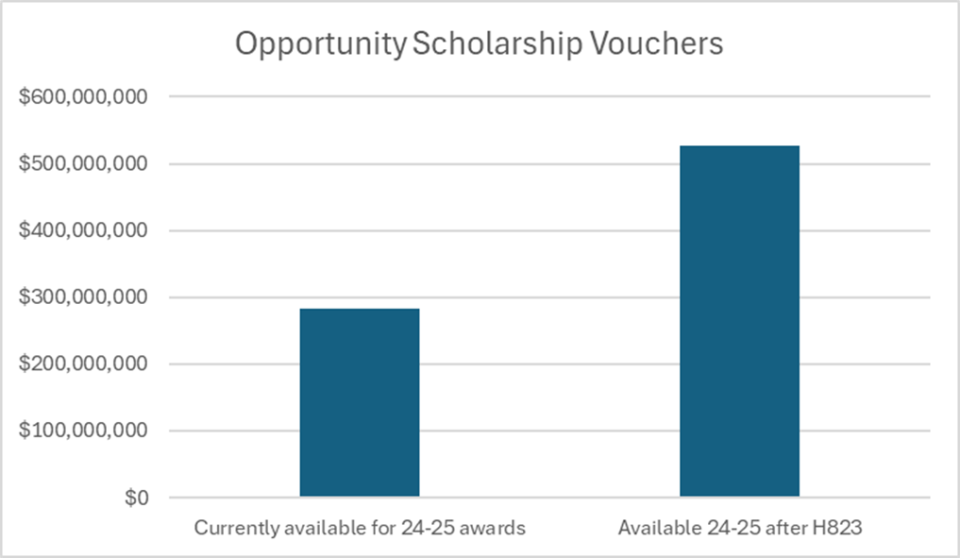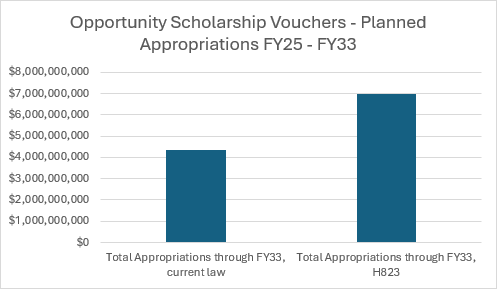School voucher changes will benefit North Carolina’s wealthiest households

Photo: Getty Images
Think of the things that you’ll be doing over the next year—planning a vacation to the beach, getting some tacos at a restaurant, hosting a regular game night with friends, or volunteering at a local food pantry. Imagine if you could receive thousands of dollars of public subsidy to do these activities you were already planning to do.
For wealthy North Carolina families who have already enrolled their children in a private school, this could be the reality. Senate leaders want to allocate thousands of dollars in public funds to pay for the private educations of families already planning to enroll their children in private schools. These families have already proven they can afford their child’s private school tuition, but Senate leaders still want to put an extra $3,360 in the pockets of millionaires.
With the onset of the legislative short session, leaders have unveiled their top priority in education. Rather than tackling the waitlist for pre-kindergarten slots, addressing record teacher vacancies, or increasing the unconstitutionally low levels of funding for public and charter schools, they have prioritized expanding the state’s voucher programs. This move only benefits the wealthy. H823 would increase Opportunity Scholarship voucher spending in FY 2024-2025 from about $284 million to approximately $526 million.
Of the additional voucher money for vouchers in the 2024-2025 school year:
$96 million (40 percent) would be awarded to middle-class and working-class families earning between 185 percent and 370 percent of the federal poverty rate ($57,721 to $115,440 for a family of four).
$107 million (44 percent) would be awarded to upper-class families earning between 370 percent and 833 percent of the federal poverty level ($115,441 to $259,740 for a family of four).
$39 million (16 percent) would be awarded to wealthy families earning more than 833 percent of the federal poverty level (over $259,741 for a family of four).
Of the approximately 72,000 students newly applying for Opportunity Scholarship vouchers, it is unclear how many are currently enrolled in private schools. The agency in charge of issuing the vouchers, the State Education Assistance Authority, has failed to release any data on what schools these new applicants currently attend.
It is likely that nearly all of these new applicants are already enrolled in private schools.
Based on changes in the 2023 budget bill, the 2024-2025 school year marks the first time students already enrolled in private schools could get voucher funding. That is, they’re newly eligible for thousands of dollars to pay for private school tuition that they have already been paying.
The funding requested to clear the 2024-2025 waitlist implies that the agency anticipates 95 percent of new applicants awarded a voucher will accept and use that voucher. In prior years, when most applicants had previously been enrolled in a public school, the voucher uptake rate was only about 60 percent because the private schools had not yet accepted these students when the voucher was awarded. If the agency now anticipates an uptake rate of 95 percent, that implies that nearly all of the unfunded voucher applicants are already enrolled in private schools.
If House Bill 823 becomes law, about 75 percent of North Carolina’s 127,000 private school students would be getting vouchers to subsidize their tuition. This is already a disproportionately wealthy group. The median North Carolina household with a child in private school earns nearly double the typical North Carolina household. These families are by no means in need of another leg up in the form of voucher payments.
H823 would also increase program funding in future years. The state’s voucher programs were already unique in being the only educational programs with guaranteed funding increases. Under current law, appropriations for Opportunity Scholarship vouchers are already slated to increase 88 percent over the next nine years. Under H823, program funding would nearly triple over the next nine years.
Under current law, North Carolina would spend $4.4 billion on vouchers over the next nine years. If H823 becomes law, the state will spend $7.0 billion on vouchers over this period.
Under these trends, H823 would put enough funding into the Opportunity Scholarship program to allow all private school students to get a voucher by the 2028-2029 school year.
Legislators’ push to subsidize wealthy North Carolinians comes at a time when the state is failing to meet its constitutional obligations to public schools. Under the 30-year-long Leandro court case, the courts have consistently found that the state is violating its obligation to provide the state’s 1.5 million public school students with decent public schools. The State Supreme Court most recently upheld this view in November 2022.
Nearly 40 percent of public school students are considered economically disadvantaged. That’s about 600,000 public school students. Students from families with low incomes face substantial educational barriers that their wealthier classmates do not face. These barriers are reflected in the persistently lower test scores and graduation rates of students from families with low incomes.
Legislative leaders have actively opposed research-based measures that would help boost the academic performance of students from families with low incomes. They’ve spent untold millions fighting the Leandro case in court.
Instead, with H823, they are rushing through legislation to give taxpayer money to the approximately 40,000 upper-class and wealthy families who have already proven that they can afford to enroll their children in private schools. The decision reflects a backward set of priorities by this legislature to benefit the upper class over normal North Carolinians. Sadly, it’s no surprise that the same legislators who have already set the state on a path to eliminate the corporate income tax are now looking to enrich wealthy private school families.
The post School voucher changes will benefit North Carolina’s wealthiest households appeared first on NC Newsline.



